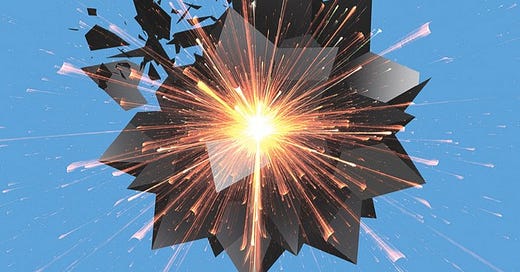The wildest and most intriguing novel of 2022 (there is something so weird about that number …) is Novel Explosives by Jim Gauer, first published in 2016 (perhaps not the ideal moment for a seven-hundred-page brainy novel to appear) and now reissued by its original publisher, the mysterious Zerogram Press. Gauer himself, were he to admit to possessing a self, is somewhat mysterious as well. He talked with The Millions and he spoke with radio interviewer Michael Silverblatt, and maybe Chris Via, who wrote Novel Explosives’ afterword, knows him. Other people must know him. The Paris Review has published his poetry and he wrote a great poem back in 1980 when he was twenty years old about the thoughts of a fire making guesses at the words it wants to use to think. (Forest and shovel are two words the fire would prefer to conceal from itself.) The poems in his long-ago collection Belaboring the Obvious are light and twisted and lovely. Then he became a venture capitalist, a VC if you will, a modern inhuman. And now there’s This, a novel so laconic and grimly glittered, so kinetic and abstruse and reckless, so knowledgeable and playful and confrontational, that it stands apart even from its influences—the Masters DeLillo, Gaddis and Gass, Pynchon and Lowry.
Novel Explosives is a big burning turning ferris wheel of a book with many colorful capsules of expertise and pods of excess, a great “orchestration,” as Via puts it, “of time and perspective.” It is violent and profound, taunting, outraged. It is arrogantly discursive yet can possess the focused intensity of a knife’s tip. A man wakes up in a room having no sense of where or even why he is, part of a triquetra which includes a bitter, morally indignant uber-capitalist and a proudly confessional drug cartel gunman. Fascinating figures, yet it is the novel itself—the language and audacity of it—that is the biggest presence here. Novel Explosives speaks many tongues—it can speak in the linguistics of many worlds—the worlds of maquiladoras, literature, weaponry and its attendant paraphernalia, pharmaceuticals, the Scovile scale of chilis, clocks and crows. Most of all, Novel Explosives speaks GUN, which is the esperanto of our time.
Gauer never lets up, though occasionally he allows the reader some troubled rest between the monstrous waves of clearly incomprehensible subjects—fungibility, consciousness, arbitrage, algorithms, physics. In these moments you can wander the pretty streets of Guanajuato with their delightful colors and flowers and fountains and thank god you don’t have to live in the suburbs of Juárez or have a surreal tea with the seriously psychotic Bird’s Nest Tom or enjoy the musings and sometimes appearances of personae invented by Pessoa or contemplate the immanent pauperization of the world’s furthest corners through mobile reception, or you can attend the difficulties of the handsome gunman Ray as he deals with the deep x-shaped incision in his chest, a message delivered to him in a dive bar named El Arbolito, which has been stitched up somewhat hastily by a veterinarian. The intermittent constancy of this suppurating wound and the worsening condition of Ray’s second favorite plaid shirt as it turns increasingly gunk-colored with bloody leakage is weirdly soothing, even optimistic.
In his fractured narrative methods, Gauer can slap us with a dash of the very coldest of waters, too, reminding us of a world we think we’re only reading about.
The Earth, a blue and gleaming jewel, floating through space in a void of aloneness that was rapidly eating itself alive, in a consumer-friendly ecocidal biophagic feeding-frenzy, and had a century or two to live at best, before becoming a smouldering garbage-barge and toxic-sludge-effluent containment vessel and rusted out morning-after party-boat …
The teller of this tale, who is constantly shifting identities, warping, changing, blowing up, reassembling, addresses us/you/the watcher/the reader, the insatiable consumer of all the stuff we’ve made and craved and tossed away, informing us more than once that it’s far too late to wash our haunted hands.
Signs and maps and guides are useless in Novel Explosives. Love is absent, sex all but unencountered. There are some minor affections, one or two boring fantasies of peace. No dogs or horses were harmed in this production though Schrödinger’s cat might be in old Tom’s freezer. The labyrinth never leads us home.
All in all a great book. An enormous book. So take the challenge. Make the leap. You’ll feel you’re really on to something. As Wittgenstein said: “I don’t know why we are here, but I am pretty sure that it is not in order to enjoy ourselves.”
He’d probably make an exception of your reading Novel Explosives though.
Joy Williams is the author of four collections of stories, a book of essays, and five novels, most recently Harrow.
Book Post is a by-subscription book review service, bringing book reviews by distinguished and engaging writers direct to your in-box, as well as free posts from time to time to those who follow us. Thank you for your subscription! Your support supports our writers and our effort to build a common reading culture across a fractured media landscape. Please help us to grow our audience by sharing this post or cheering us on social media.
Gibson’s Bookstore is Book Post’s current partner bookseller! We partner with independent bookstores to link to their books, support their work, and bring you news of local book life as it happens in their communities. We’ll send a free three-month subscription to any reader who spends more than $100 with our partner bookstore during our partnership. Send your receipt to info@bookpostusa.com.




Here is a story for you, dear readers! Joy Williams found this book via a little ad in Harper's, with ringing endorsements from Michael Silverblatt, host of San Francisco's long-running author-interview show "Bookworm," and William Gaddis afficionado Steven Moore. She ordered it, loved it, and asked to write about it. So... the road to readers is long and winding.